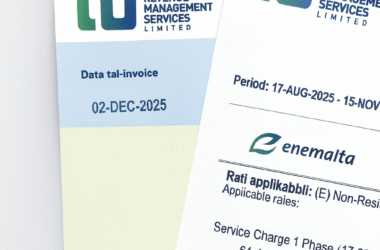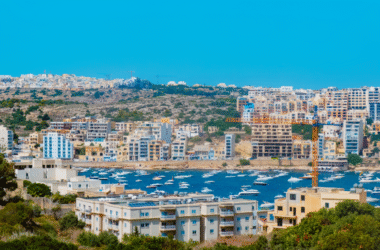Bei Expatax helfen wir Rentnern, sich auf Malta und Gozo niederzulassen. Wir sprechen über Steuern, Wohnsitz, Immobilien und das tägliche Leben, aber ein Thema kommt immer wieder auf: die Krankenversicherung.
Allein in den letzten Monaten haben wir EU-Paare getroffen, die private Verträge für über 3.000 Euro pro Jahr abschließen wollten, obwohl sie bereits Anspruch auf die öffentliche Gesundheitsversorgung in Malta hatten.
Dieser Leitfaden soll genau das verhindern.
Wenn Sie als Rentner aus der EU, dem EWR, der Schweiz oder dem Vereinigten Königreich planen, in Malta oder Gozo in den Ruhestand zu gehen, ist die Kenntnis Ihres Anspruchs auf S1-Krankenversorgung der Schlüssel zur Vermeidung unnötiger Kosten und zur Gewährleistung eines reibungslosen Übergangs.
Wie das Gesundheitswesen in Malta funktioniert
Malta verfügt über ein öffentliches Gesundheitssystem, das durch Steuern und Sozialversicherungsbeiträge finanziert wird. Bürger und versicherte Einwohner können staatliche Krankenhäuser und Kliniken nutzen, ohne Versicherungsprämien zu zahlen. Das öffentliche Netz konzentriert sich auf Msida, das Mater Dei Hospital und das Gozo General Hospital sowie auf ein Netz von staatlichen Gesundheitszentren auf den Inseln. Dieses System deckt die stationäre Versorgung, Notfallbehandlungen, ambulante Kliniken und eine breite Palette von Dienstleistungen für die Anspruchsberechtigten ab.
Daneben verfügt Malta über einen gut entwickelten privaten Sektor, der aus privaten Krankenhäusern, medizinischen Zentren und einzelnen Fachärzten besteht. Hier genießen die Patienten in der Regel kürzere Wartezeiten, mehr Komfort und eine größere Auswahl, aber sie zahlen über eine private Versicherung oder direkt aus eigener Tasche.
Für jeden, der sich nach Malta zurückzieht, ist die eigentliche Frage nicht, ob das System funktioniert. Es geht darum, wer im Hintergrund die Rechnung bezahlt. Hier spielen die S1 und die privaten Krankenversicherungen eine zentrale Rolle.
Rentner aus der EU, dem Vereinigten Königreich und der Schweiz: Warum das Formular S1 so wichtig ist
Die S1 ist eine europäische Bescheinigung, mit der Sie Ihre Ansprüche auf staatliche Gesundheitsversorgung von Ihrem Heimatland in das Land, in dem Sie leben, mitnehmen können. Wenn Sie eine staatliche Rente aus einem EU- oder EWR-Land, der Schweiz oder dem Vereinigten Königreich beziehen, ist Ihr Rentenstaat möglicherweise weiterhin für Ihre Gesundheitskosten zuständig, wenn Sie ins Ausland ziehen, und kann einen S1 ausstellen.
Wenn Sie den S1 in Malta bei der Berechtigungsstelle anmelden, erhalten Sie eine Berechtigungsbescheinigung. Damit wird bestätigt, dass Sie das öffentliche Gesundheitssystem Maltas zu den gleichen Bedingungen wie ein maltesischer Staatsbürger nutzen dürfen. Malta erstattet dann die Kosten für Ihre Behandlung von Ihrem Heimatland im Rahmen der Sozialversicherungskoordinierung. Sie legen Ihre Bescheinigung in Krankenhäusern und Gesundheitszentren vor und werden wie jeder andere versicherte Einwohner behandelt.
Sie haben wahrscheinlich Anspruch auf eine S1, wenn Sie Bürger der EU, des EWR, der Schweiz oder des Vereinigten Königreichs sind, wenn Sie eine staatliche Rente aus Ihrem Heimatland beziehen und wenn dieses Land nach seinen Vorschriften weiterhin für Ihre Gesundheitskosten aufkommt, solange Sie in Malta leben. In vielen Fällen können auch Ihr Ehegatte oder Ihr unterhaltsberechtigter Partner und Ihre Kinder über Ihre S1 versichert sein, obwohl die genauen Bestimmungen von Land zu Land unterschiedlich sind. Wenn Sie einen Antrag stellen, sollten Sie unbedingt nach unterhaltsberechtigten Personen fragen.
Für pensionierte EU-Bürger, Bürger des Vereinigten Königreichs oder der Schweiz wird bei der Beantragung eines Wohnsitzes in Malta als wirtschaftlich selbstständige Person in der Regel eine registrierte S1 als Nachweis für einen umfassenden Krankenversicherungsschutz akzeptiert. In der Praxis bedeutet dies, dass Sie in der Regel keine private Krankenversicherung abschließen müssen, nur um das Aufenthaltserfordernis zu erfüllen. Ihre Anspruchsbescheinigung tritt bei der Antragstellung an die Stelle einer Versicherungspolice. Genau das ist der Fehler, den viele Rentner machen. Sie schließen private Policen ab, die Tausende von Euro pro Jahr kosten, und stellen erst später fest, dass sie mit einer S1 den vollen Zugang zum öffentlichen System ohne jegliche Prämie erhalten hätten.
Schritt-für-Schritt-Anleitung zur Nutzung der S1 in Malta
Im Folgenden wird der S1-Prozess in einfachen, leicht nachvollziehbaren Schritten erklärt, damit Sie genau wissen, was zu tun ist, sobald Sie sich für einen Umzug nach Malta entscheiden.
Schritt 1: Beantragen Sie die S1 vor Ihrem Umzug
Wenden Sie sich an die Stelle, die in Ihrem Heimatland für die staatliche Gesundheitsversorgung oder die Renten zuständig ist, und fragen Sie, ob Sie in Malta Anspruch auf eine S1-Rentenbescheinigung haben. Erklären Sie, dass Sie als Rentner umziehen, und fragen Sie, ob Ihr Ehepartner oder unterhaltsberechtigte Personen in die Bescheinigung aufgenommen werden können.
Schritt 2: Bereiten Sie Ihre Malta-Dokumentation vor
Sobald Sie in Malta oder Gozo angekommen sind, besorgen Sie sich Ihren Reisepass oder Personalausweis, Ihre maltesische Steuernummer, einen Adressnachweis und Ihr Originalformular S1. Bringen Sie etwaige Heirats- oder Geburtsurkunden mit, wenn Sie Familienangehörige anmelden wollen.
Schritt 3: Registrieren Sie Ihr S1 bei der Entitlement Unit
Übermitteln Sie Ihre S1 an das Referat Anspruchsberechtigung, Damit wird bestätigt, dass ein anderer Staat für Ihre Gesundheitsversorgung zuständig ist. Sie stellen eine Berechtigungsbescheinigung aus, das Dokument, das Ihnen Zugang zur öffentlichen Gesundheitsversorgung in Malta gewährt.
Schritt 4: Verwenden Sie Ihr S1 in Ihrer Bewerbung um einen Wohnsitz
Bei der Beantragung eines Aufenthalts als wirtschaftlich unabhängiger EU-Rentner oder ähnlicher Rentner gilt Ihre Anspruchsbescheinigung in der Regel als die erforderliche Krankenversicherung. Auf diese Weise kann die S1 ersetzt den Abschluss einer privaten Versicherung bei der Antragstellung.
Schritt 5: Anmeldung beim öffentlichen Gesundheitssystem
Sobald Ihr S1 bearbeitet ist, können Sie sich bei einem örtlichen Gesundheitszentrum oder Hausarzt anmelden und das öffentliche System wie jeder versicherte maltesische Einwohner nutzen.
Schritt 6: Behalten Sie Ihr S1 und organisieren Sie einen EU-Reiseschutz
Ihre S1 bleibt gültig, solange Sie Ihre Rente aus dem Heimatland beziehen und in Malta wohnen. Für Reisen in andere EU-Länder beantragen Sie bei Ihrer Heimatbehörde eine EKVK oder UK GHIC.
Kennenlernen der EHIC - Europäische Krankenversicherungskarte
Was eine private Krankenversicherung in Malta normalerweise abdeckt

Eine private Krankenversicherung ist für S1-Inhaber fakultativ, aber viele Rentner entscheiden sich dennoch für eine kleine Police, um Komfort, Schnelligkeit und Zugang zu privaten Krankenhäusern zu haben. Die privaten Tarife in Malta umfassen in der Regel eine Mischung aus Krankenhausbehandlung, Facharztkonsultationen und diagnostischen Tests.
Typischerweise werden folgende Themen abgedeckt:
- Stationäre und teilstationäre Krankenhausbehandlung
- Kosten für Operationen und Operationssäle
- Notfallbehandlung und Ambulanzdienste
- Fachärztliche Konsultationen und diagnostische Tests
- Wahlweise ambulante, zahnärztliche, mütterliche oder optische Leistungen
Krankenversicherer sollen sich für eine fakultative Privatversicherung einsetzen
Wenn Sie sich entscheiden, Ihre S1 mit einer privaten Versicherung zu ergänzen, um den Zugang zu Fachärzten oder Privatkliniken zu beschleunigen, gibt es auf Malta mehrere seriöse Anbieter.
Zu den üblichen lokalen Optionen gehören:
- Atlas Gesundheitswesen
- Bupa Malta
- GasanMamo
- MAPFRE Middlesea
- Laferla Versicherung
Internationale Expat-Versicherer wie Cigna, AXA, Allianz und andere bieten auch in Malta gültige Tarife an.
Die private Versicherung für EU-Rentner ist völlig freiwillig und wird in der Regel eher aus Bequemlichkeit als aus Pflichtbewusstsein gewählt.
Wie man Angebote vergleicht, ohne sich in Details zu verlieren
Für einen Nicht-EU-Rentner im Alter von fünfundsechzig Jahren und darüber liegt die Spanne zwischen dem günstigsten und dem teuersten Krankenversicherungsangebot häufig bei mehreren tausend Euro. Es kommt auch häufig vor, dass zwei Policen, die auf dem Papier den Wohnsitzbestimmungen entsprechen, bei näherer Betrachtung einen sehr unterschiedlichen Schutz bieten.
Beginnen Sie beim Vergleich mit dem Deckungsumfang. Prüfen Sie, ob die Versicherung nur stationäre oder auch ambulante Leistungen abdeckt und wie die Krebsbehandlung geregelt ist. Achten Sie auf jährliche Höchstbeträge und darauf, ob bestimmte Behandlungsarten begrenzt sind. Auch der geografische Geltungsbereich der Versicherung ist wichtig. Einige Policen konzentrieren sich nur auf Malta, andere schließen Malta und die EU ein, und wieder andere bieten weltweiten Versicherungsschutz, mit oder ohne die Vereinigten Staaten. Viele Rentner entscheiden sich dafür, den Geltungsbereich einzugrenzen, um die Kosten zu kontrollieren.
Ausschlüsse und Beschränkungen sollten Sie sorgfältig lesen. Wenn Sie bereits an einer Krankheit leiden, sollten Sie sich vergewissern, dass Sie wissen, ob diese vollständig ausgeschlossen, mit Einschränkungen oder normal abgedeckt ist. Selbstbeteiligungen und Zuzahlungen können ebenfalls verwirrend sein. Informieren Sie sich, ob die Selbstbeteiligung pro Schadensfall, pro Jahr oder pro Erkrankung gilt, und entscheiden Sie, ob die Höhe für Sie realistisch ist. Erkundigen Sie sich auch, wie sich die Prämien im Laufe der Zeit verändern werden. Viele Versicherer stufen Sie mit zunehmendem Alter in teurere Altersgruppen ein, und einige behalten sich das Recht vor, die Bedingungen auf der Grundlage Ihres Schadenverlaufs anzupassen. Es ist besser, wenn Sie dies von Anfang an wissen.
Wenn ein Angebot im Vergleich zu den anderen ungewöhnlich günstig erscheint, sollten Sie es nicht unterschreiben, nur weil es die niedrigste Zahl ist. Nehmen Sie sich einen Moment Zeit, um den Wortlaut der Police zu lesen und zu prüfen, ob sie wirklich den Anforderungen Ihres Wohnsitzes entspricht und ob sie die Risiken abdeckt, die für Sie am wichtigsten sind.
KONTAKTIEREN SIE UNS
Planen Sie eine Konsultation
Häufige Mythen und Fehler, die wir in Malta sehen
Ein häufiger Mythos ist, dass alle Rentner in Malta eine private Versicherung abschließen müssen. Für EU/EWR/Schweizer Rentner, die im Besitz einer S1 sind, trifft dies nicht zu. Sobald sie registriert sind, erfüllt die S1 sowohl die Ansprüche auf die öffentliche Gesundheitsversorgung als auch die Aufenthaltsanforderungen.
Ein weiteres Missverständnis ist, dass die EHIC-Karte ausreicht, um in Malta zu leben. Das ist sie nicht. Die EKVK ist für vorübergehende Aufenthalte gedacht. Langfristig Ansässige müssen sich auf die maltesische Sozialversicherung oder die S1 verlassen. Manche Rentner befürchten auch, dass die Anmeldung einer S1 kompliziert ist. In Wirklichkeit handelt es sich um ein Standardverfahren, das regelmäßig von der Entitlement Unit bearbeitet wird.
Und schließlich: Die öffentliche Gesundheitsversorgung in Malta ist gut und nicht zweitklassig. Viele Rentner nutzen es als ihr Hauptsystem und schließen nur aus Bequemlichkeit eine private Versicherung ab.
Reale Szenarien von Kunden in Malta
Ein deutsches Ehepaar, das in Gozo lebt, wandte sich an uns, nachdem es Angebote für eine private Versicherung in Höhe von 2.800 € pro Person und Jahr erhalten hatte. Sie nahmen an, dass dies obligatorisch sei. Nach einem Gespräch mit ihnen erfuhren wir, dass beide eine deutsche staatliche Rente beziehen. Sie forderten S1-Formulare an, meldeten sie an und nutzten ihre Berechtigungsscheine für ihre Aufenthaltsanträge, wodurch sie über 5 000 € an jährlichen Ausgaben einsparten.
In einem anderen Fall ging es um eine französische Rentnerin, die zwei Jahre lang eine private Versicherung abgeschlossen hatte, bevor sie von der S1 erfuhr. Nachdem sie davon erfahren hatte, meldete sie ihre S1 an, kündigte ihre unnötige Police und sparte jährlich Tausende.
Was Sie bei der Planung beachten sollten
Wenn Sie als Rentner aus der EU, dem Vereinigten Königreich oder der Schweiz vermuten, dass Sie Anspruch auf S1 haben könnten, sollten Sie sich zunächst an die Behörden Ihres Heimatlandes wenden. Wenn Sie die Voraussetzungen erfüllen, beantragen Sie die S1-Bescheinigung vor Ihrem Umzug, bringen Sie sie zusammen mit Ihrem Ausweis, Ihrer Steuernummer und Ihren Adressdaten mit nach Malta und lassen Sie sie bei der Anspruchsberechtigungsstelle registrieren. Verwenden Sie die sich daraus ergebende Anspruchsbescheinigung als Nachweis für die Gesundheitsversorgung bei der Beantragung Ihres Wohnsitzes, und entscheiden Sie dann in aller Ruhe, ob Sie zusätzlich eine optionale private Versicherung abschließen möchten.
Abschließende Überlegungen des Expatax-Teams
Der Ruhestand auf Malta oder Gozo steht für einen langsamen Rhythmus, vertraute Gesichter auf dem Dorfplatz und die Annehmlichkeiten eines Lebens in Meeresnähe. Die Gesundheitsversorgung ist eine der Grundlagen dafür, dass Sie dieses Leben ohne ständige Sorgen genießen können.
Für Rentner aus der EU, dem Vereinigten Königreich und der Schweiz ist das S1-Formular oft das wertvollste Dokument im gesamten Umsiedlungsprozess. Richtig verwendet, kann es Ihnen Tausende von Euro an unnötigen privaten Versicherungsprämien ersparen und Ihnen vollen Zugang zum öffentlichen System Maltas verschaffen.
Wenn Sie sich nicht sicher sind, ob Sie die Voraussetzungen für eine S1 erfüllen, welche Wohnform für Sie in Frage kommt oder wie Sie sich als Rentner in der Krankenversicherung zurechtfinden, Expatax kann Sie Schritt für Schritt begleiten, so dass Ihr Umzug nach Malta oder Gozo von einem Ort der Klarheit und Zuversicht ausgeht und nicht von Verwirrung.
Folgen Sie uns auf unseren Social-Media-Kanälen für weitere tägliche Einblicke, Updates, Geschichten von Expats und Leitfäden.







